How to follow Google Business Profile guidelines
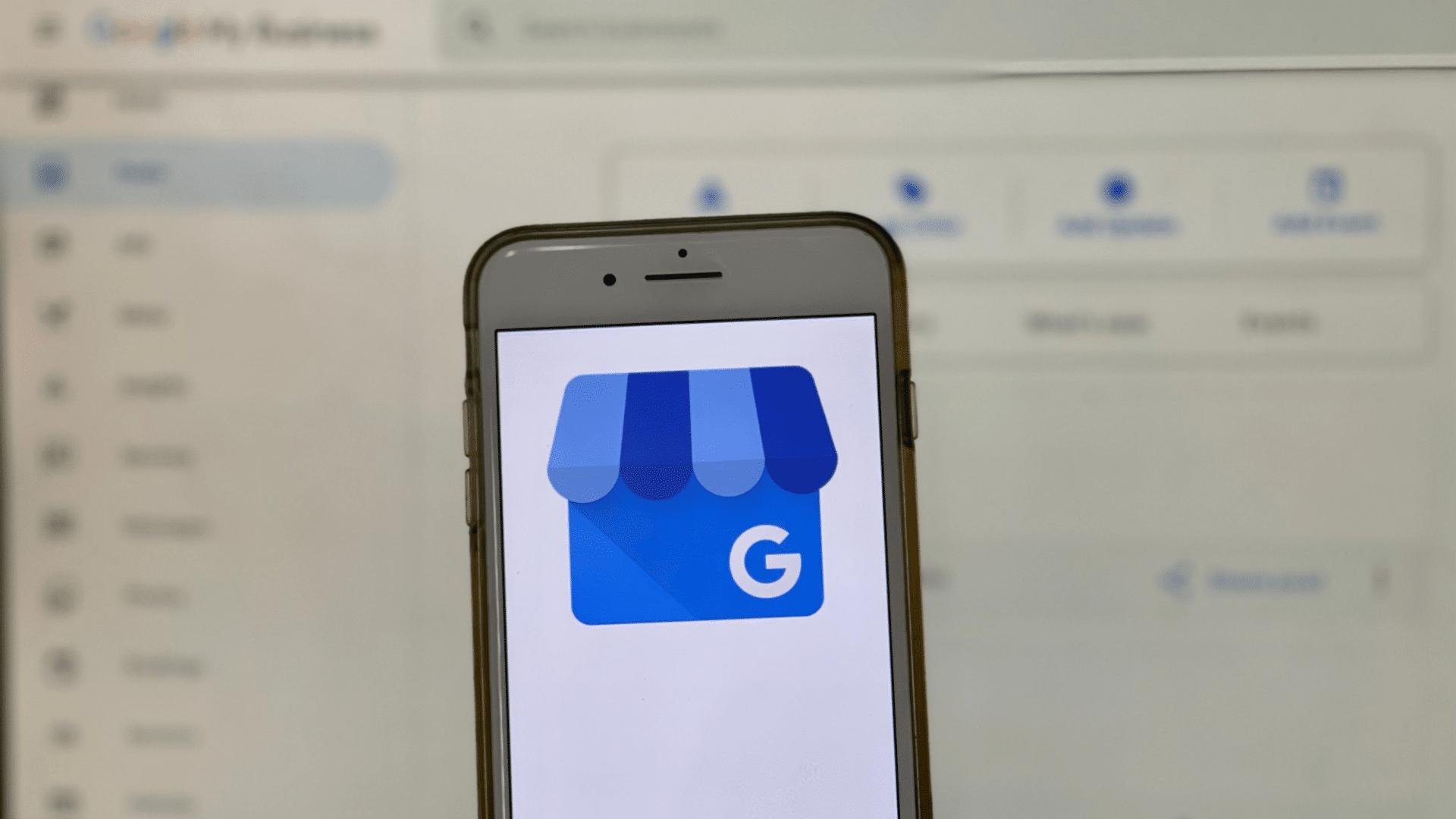
Whether you’ve had your Google Business Profile (GBP) for 10 years or you have a new business and are just getting ready to claim your Business Profile, it’s important that you carefully read – and understand – Google’s guidelines.
If you don’t, your GBP listing will likely get suspended.
A suspension means that your Business Profile will not show publicly, or it will show, but you won’t have control over any of the information on it. (And that’s not a good thing!)
As a Google Business Profile Platinum Product Expert, I often see posts like this on the GBP Help Forum.
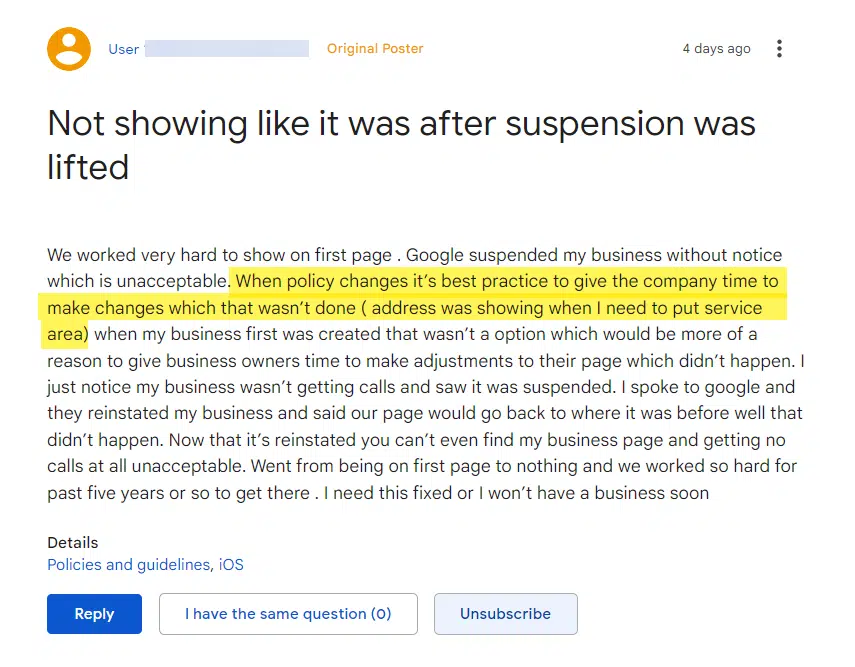
If you have a Google Business Profile, it’s up to you to know and follow Google’s rules.
Google can change them anytime and won’t typically notify users of guideline changes. Even a slight change in wording could impact whether your Business Profile complies.
This article discusses some of the critical Google Business Profile guidelines and the latest changes to the policies you may not be aware of.
Updated guidelines released by Google
Google sent an email to GBP managers and owners on July 31, letting them know that they updated their help documents to make it easier for people to understand the guidelines.
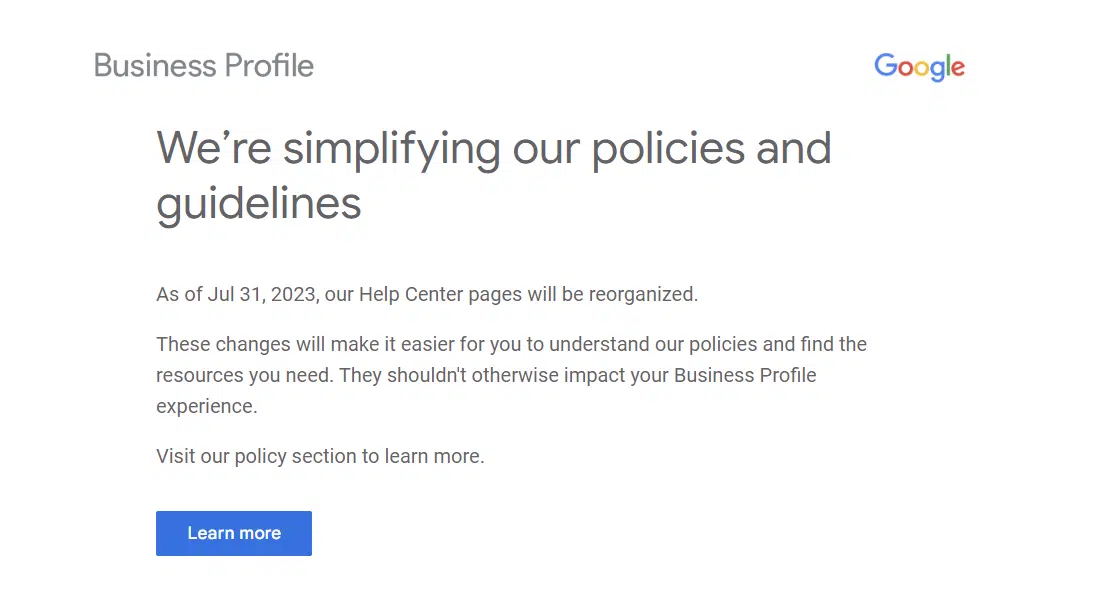
Here are the most important links you need to pay attention to:
It’s a good idea to bookmark these links. Just be aware that there are many more specific help documents that you’ll discover once you dig into the guidelines.
First, is your business eligible for a Google Business Profile?
Google Business Profiles are meant for businesses that meet face-to-face with local customers. You do not qualify for a Google Business Profile if your business doesn’t meet that basic condition.
There are other requirements for a company to claim a Google Business Profile.
First, you must have a physical location for your business – and it must be your location (you can’t use another business’ location unless it meets specific qualifications.)
There are essentially three different types of business GBP locations.
- One location can be your home – typically making you a Service Area Business (SAB), where you go out to meet your customers at their location or another location, like a coffee shop (for instance). Service Area Businesses cannot show their physical address in their Google Business Profile.
- Another business type is a storefront where customers come to your location to either shop or meet with you.
- The third business type is a hybrid business, where you have a storefront with permanent signage, have employees staffed there during business hours, and go out to customers to service them at their location.
- A good example of a hybrid location is an appliance store that has a storefront that sells appliances and has a team of employees that goes out to deliver and repair appliances at customers’ homes.
- Another example would be an insurance agent that has an office location that clients come to, but the insurance agent also goes out to clients’ homes to meet with them as well.
Ideally, each business should only have one Google Business Profile.
Google discourages home-based businesses from having more than one business from the same residential address.
(If more than one Business Profile is set up at the same residential address, it is likely that one or both Business Profiles will get suspended. This is to prevent abuse and spam.)
If you are a Service Area Business, you can have one location per metropolitan area within a two-hour driving radius.
Franchises and other storefront locations, like McDonald’s or Lowe’s (for example), can have multiple locations in cities, which is fine per Google’s guidelines.
Each of the different types of business locations has its own specific guidelines you must follow. Be sure to read up on the guidelines if you have a Service Area Business, a storefront location or a hybrid business, and adhere to the precise rules you must comply with.
Now let’s talk about virtual offices and co-working spaces. If your business rents a physical mailing address but doesn’t operate out of that location – often called a virtual office – that location isn’t eligible for a Business Profile.
Businesses also can’t list an office at a co-working space unless that office has clear signage, can see customers at the location during business hours and is staffed by your employees during business hours.
Typically, Google also requires you to rent a dedicated workspace or office at co-working spaces.
So, if your GBP listing were to get suspended, you’d have to provide Google with a copy of the lease showing that you have your own separate work area that belongs to just your company. (So most co-working spaces are ineligible for Google Business Profiles.)
Here are just some more examples of ineligible business types that are not allowed to have Google Business Profiles:
- An ongoing service, class or meeting at a location you don’t own or have the authority to represent. (If you have an exercise company with classes at your local church basement in the morning, your business would not qualify for a Google Business Profile.)
- Lead generation agents or companies.
- Brands, organizations and artists.
- Online-only businesses.
- Rental or for-sale properties like vacation homes, model homes or vacant apartments.
- Any business whose address is listed as a P.O. Box or mailbox in a remote location (like a UPS box.)
Also, Google wants your information to be as accurate as possible.
To help keep information accurate, Google uses information from different sources like user reports and licensed content (i.e., third-party data).
If Google determines that your business doesn’t exist in the location you claim it does, Google will disable your profile (i.e., suspend your Google Business Profile.)
Keep in mind that Google can determine how best to display your business address based on information provided by the business and other relevant sources it finds online.
This ensures that the address accurately reflects the business and how the customers are served.
This is not an entire list of eligible businesses or the guidelines, so please carefully read Google’s Guidelines for Representing Your Business on Google.
Who can manage your profile and how should they manage it
Google prefers the business owner to claim, verify and manage a Google Business Profile.
But if you have a marketing agency helping you with your GBP, you can add others later as Managers to your Business Profile. It’s best to have as few people on your GBP account as possible.
In a recent update to the guidelines, Google has specifically laid out some guidelines regarding ownership of GBPs.
They state that only business owners or authorized representatives can verify and manage business information on a Business Profile.
Google has also confirmed that they can revoke GBP ownership for a variety of reasons:
- You haven’t signed into your account recently – content may also be removed after adequate warnings.
- The business confirmed that you or the agency is no longer authorized to manage the GBP.
- Google hasn’t been able to reach you by email after several attempts to confirm your affiliation with the business.
- You or another profile owner deleted your profile.
- You created your business profile through another Google product and that product profile has been suspended.
- If it’s been determined that a different merchant is the authorized owner of a business profile, access to other unauthorized users will be revoked.
If any of these happen, you can attempt to reverify or request ownership from the new business owner following the steps in the Resolve owner conflicts help article.
Tip: Do not try to delete your Google Business Profile from your dashboard and create another Google Business Profile. That will create what’s known as a “duplicate listing” and will likely cause issues with both listings.
Additional guidelines for authorized representatives
Google also outlined other important ownership and manager rules in this recent help guidelines update.
These are especially important if you are a marketing agency that manages GBP listings for clients or a business owner considering hiring a marketing agency to manage your Google Business Profile.
According to Google:
“Any person or company that manages information on a Google Business Profile that they don’t own is considered an authorized representative. Examples of “authorized representatives” would be a third-party SEO/SEM company, a friend of the business owner, an online ordering, scheduling, or booking provider, an affiliate network provider or some other person or business entity that is managing or working on your GBP listing.”
Authorized representatives must:
- Never claim a Business Profile without express consent from the business owner.
- Never make false, misleading, or unrealistic claims.
- Never use harassing, abusive, or untrustworthy tactics with potential or existing customers.
- Always work directly with the business owner to complete verification.
- Always ensure the business owner understands what a Business Profile on Google is and where Business Profile data is used.
- Always keep the business owner informed about which actions the authorized representative will take on the Business Profile.
- Always follow the Guidelines for representing your business on Google. Note that the phone number and website for a Business Profile should always be the single, authoritative phone number and website for the business and be verifiable by the business owner.
- Promptly respond to management access requests and transfer Business Profile ownership to the business owner immediately upon request.
- Authorized representatives must, whenever possible, encourage the business owner to create an account, own the Business Profile, and add authorized representatives as managers. (Learn how to transfer ownership.)
- Website content must be owned and managed by the business owner.
Failure to follow these policies can result in a suspension of the Business Profile and/or Google Account.
Authorized representatives should also share the following resources with the business owner:
This is important so that the business owner is aware of Google Business Profile guidelines.
If you are a business owner, it’s crucial that you stay involved in your GBP listing. Your Google Business Profile is often the lifeblood of your business.
Never put your trust solely in an authorized representative/digital marketing agency.
If that authorized representative violates Google’s guidelines, your Google Business Profile could get suspended even though your listing – or you – didn’t do anything wrong.
So make sure that you’re working with a marketing agency that truly has extensive and expert experience working with Google Business Profiles. Because if they do something wrong, your Business Profile will be held accountable for it.
And if it gets suspended because of something the agency did wrong, you may not get your Business Profile reinstated.
Get the daily newsletter search marketers rely on.
Business naming rules
According to Google, your business name should reflect your real-world company name, as used on your storefront signage, website, stationary and as known to customers.
This would also include how your business is presented on the branding of your service area vehicles and other legal documents that contain your company’s business name (i.e., incorporation or LLC documentation or business license).
All this information should align and match your Google Business Profile’s business name.
Including unnecessary or extra information (i.e., additional words) in your GBP business name violates Google’s guidelines and could result in a suspension.
Your Google Business Profile business name must not include any of the following:
- Marketing taglines
- Store codes
- Trademark/registered signs
- Fully capitalized words
- Business hours information
- Phone numbers or website URL’s
- Special characters (e.g. %$@/”) or irrelevant legal terms
- Service or product information
- Location information
- Any keywords that aren’t part of your official business name
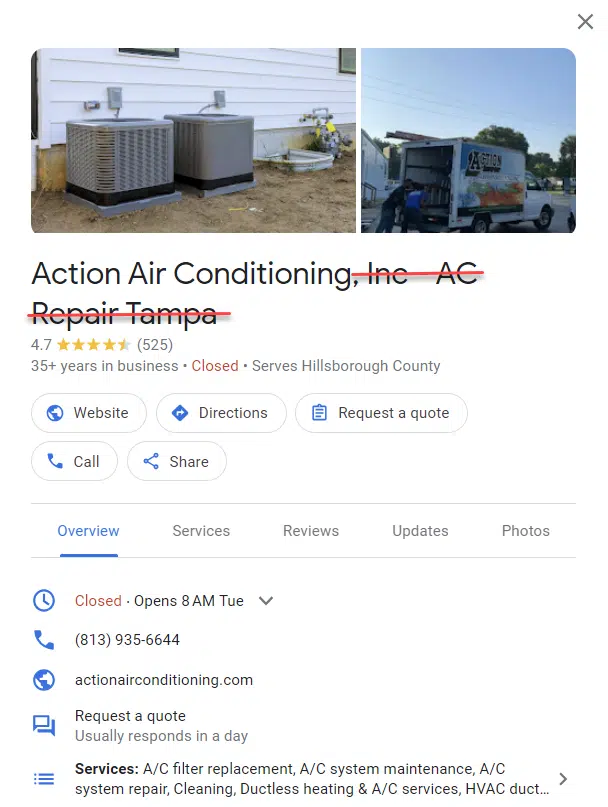
If you’re a practitioner, like a doctor, dentist, chiropractor, lawyer, financial planner, insurance agent or realtor, your Google Business Profile business name can only be your first and last name.
Business Profiles for practitioners may include title or degree certification (for example, Dr., MD, JD, Esq., CFA). No other words or names can be added!
So, if you’re a realtor, you cannot add the word “Realtor” or “Real Estate Agent” after your first and last name; that would violate guidelines.
Note that sales associates or lead generation agents for corporations aren’t considered individual practitioners and are not eligible for a Business Profile.


Setting your business hours
Your Business Profile must show accurate hours. Customers rely on those hours when making decisions on who to shop with, and an hour’s filter can even appear in search results, which can impact a searcher’s decision on who to shop with.
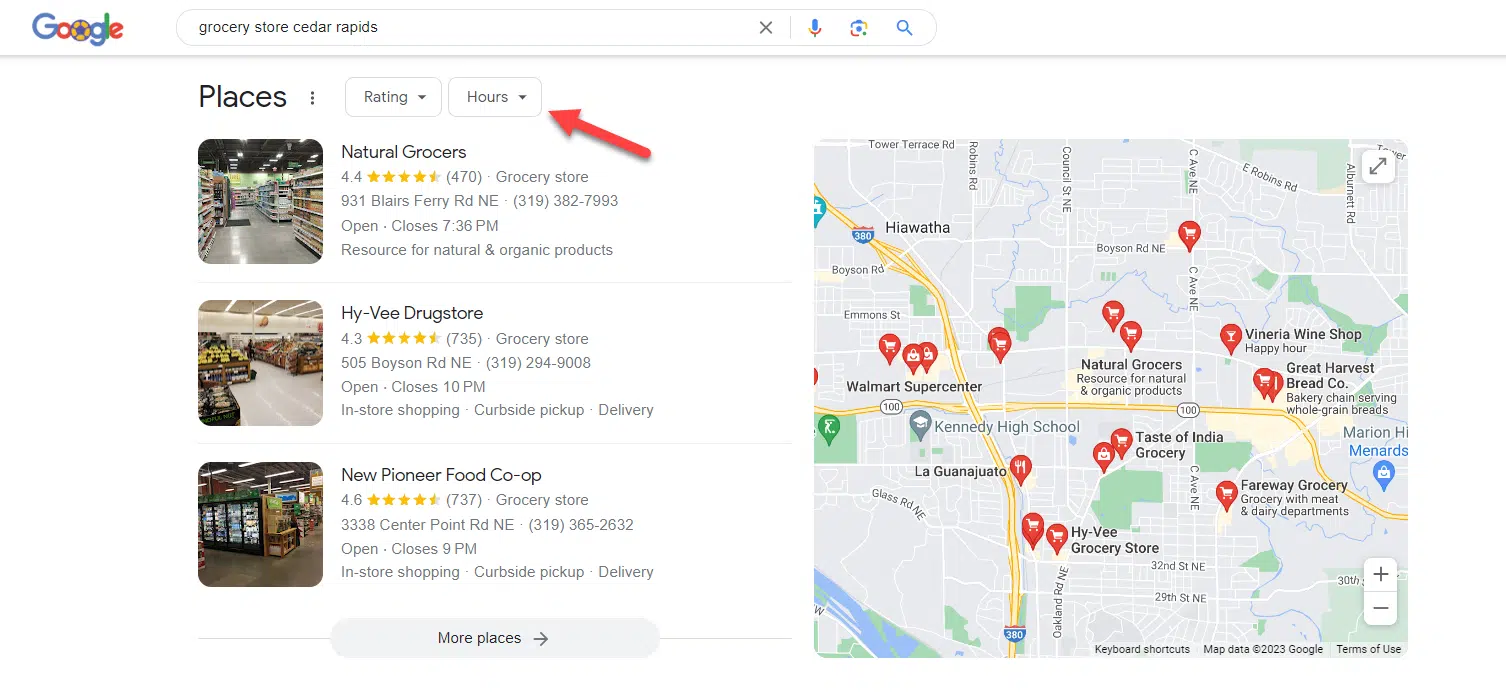

Whether you have a storefront or a Service Area Business (SAB), the business hours you set up should be when your employees are ready to help customers or clients.
For storefront locations, studies have shown that people rely on business hours to know when they can come to your business, so it’s essential to keep your business hours up-to-**** and accurate.
If you answer your phone 24 hours a day, your Google Business Profile business description and website are where you should put that information.
However, if you truly do run a business that is open 24/7 and has your employees staffed at your business 24 hours a day, like a 24-hour grocery or convenience store, then it’s appropriate to list your hours as 24 hours.
Google has recently stated that certain types of businesses should not have set business hours.
If your business has varied hours and days (like schedules for different activities, including showtimes, worship services or classes) or operates by appointment only, you should not list your hours of operation.
Here are some examples of businesses that shouldn’t provide set business hours:
- Indoor lodging like hotels, motels, and apartment buildings/complexes
- Schools and universities
- Movie theaters
- Transportation services and airports
- Event venues and natural features (like National parks)
You may be wondering why Google recommends not displaying hours for some of these types of businesses – especially when many have standard business hours.
I’m not sure exactly why, but in some cases, the business can set hours, but those hours often don’t display in the company’s Google Business Profile Knowledge Panel.

To get even more detailed information on how to correctly set your company’s business hours on your Google Business Profile, be sure to read the complete guidelines.
Account-level restrictions
The specific discussion of account level restrictions is also new with the latest guidelines update. Merchants can lose access to their Business Profile or have their access restricted for a variety of reasons.
Google account not in good standing
If a Google Account is not in good standing (e.g., it is disabled, suspended, or deleted) you must take steps to fix the issue before your Google Business Profile will be reinstated.
Account restricted from Business Profile activity
If a merchant has a pattern of violating Google Business Profile policies, their Business Profile access might be restricted, and all Business Profiles associated with that account will be suspended.
When an account is restricted, content added from the restricted account will be rejected. The account must be reinstated before any previously removed content (like user reviews) can be successfully reinstated or new content (like posts) can be added to the profile.
Profile suspension due to other Google product account restriction
When a Business Profile is created via an account that’s associated with another Google product (like Google Ads or YouTube), restriction of the non-Business Profile product account can result in suspension of the Google Business Profile.
This is the first time Google is providing transparency on how interconnected all of Google’s products are to Google Business Profiles and how a merchant can lose access to their GBP listing.
When a non-Business Profile account is restricted, content added to the business profile from the restricted account may be rejected.
To fix this, the non-Business Profile account must be reinstated before you try to reinstate the Google Business Profile.
Following Google’s guidelines is key
When a Google Business Profile suspension happens, I’ve had businesses tell me they lose thousands and thousands of dollars a day (some as high as $20,000 per day!)
So it’s important that you follow Google’s guidelines so you avoid getting your GBP listing suspended at all costs. That means you must become familiar with the guidelines – and follow them all.
Now is the time to brush up and read Google’s guidelines and ensure your GBP listing complies.
Opinions expressed in this article are those of the guest author and not necessarily Search Engine Land. Staff authors are listed here.
Source link : Searchengineland.com



